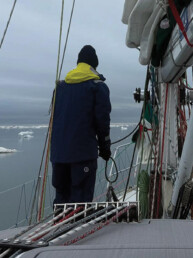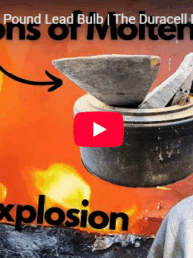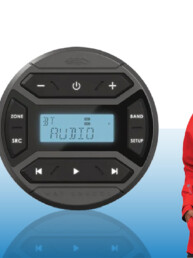It’s a bright, beautiful late summer day and you’re out on the water. There isn’t a lick of wind and perhaps a decent current, which means you are depending on your faithful iron sail to take you to the next destination. It seems like “smooth sailing” when suddenly—silence.
That trusty iron sail of yours has come to a rather abrupt stop, and you now are clambering around the boat trying to figure out why. For many of us, this is a real fear, and a very real situation. Many times, it’s not a terribly difficult or involved fix, however knowing the basic steps to take first is critical to keeping yourself, the boat, and anyone around you safe.
REMEMBER WHAT YOUR DIESEL NEEDS TO RUN
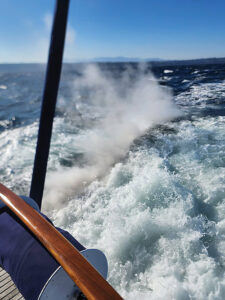
A diesel engine requires three things to run: fuel, air, and compression. If one of these components is lacking or missing completely, there will be no combustion, or very poor combustion inside the cylinders. Think of the fire triangle—fuel, air, heat—it’s the same concept. When fighting a fire, firefighters are simply attempting to remove one of the sides of the fire triangle to put out the fire. Your engine has a similar combustion triangle.
When the engine dies abruptly, it could be many things. But before you can explore which of those myriad options have caused the failure, one of the most important things to do is to get yourself into a safe place so you can assess the situation and consider your recourse. It’s possible that your location allows you to do a preliminary assessment, but often your first priority may be moving the boat elsewhere. Sailors have the good fortune to raise a sail to maintain steerage and headway to another location in most conditions, some power vessels may have an auxiliary kicker motor to employ, you may need to try dropping an anchor, or you might have to call for a tow if you’re in a dangerous place.
A common way to misstep early on is overcomplicating the situation, and you’re more likely to do this if you’re in a hurry. Getting the boat somewhere safe so you have the time and ability to think through the problem is the best way to avoid that error. Your wallet and your engine will thank you.
Understanding and implementing the basics will always get you the farthest. By taking the time to systematically tackle each of these three components of the combustion triangle, you will work your way through the problem and be back on your way.
FUEL
Fuel is one of the most obvious issues leading to a dead engine. Without diesel, the engine has no chance of running, or will run poorly with no power. Much of the time, there is a warning though—the operator may notice the engine seems to have less “power” or is not responsive to throttle changes like before. If you experience this, it’s critical to check the basics first.
When I went through engineering school, I was forced to trace out every system onboard the ship I worked on. This was daunting, as the ship was a 554-foot steam ship that had several hundred miles of pipes, and innumerable valves and other bits of hardware in between each component. Recreational boaters on smaller vessels should similarly take the time at the dock to trace the fuel system. Start at the main fuel tank or tanks and work your way to the engine. If the engine has died due to fuel starvation, checking your tank valve to see if it is closed is a good place to start. Then, move onto your primary and secondary fuel filters. Many times I am called out for a dead engine, and the issue was something painfully simple, and the service call to fix said problem was expensive. Changing fuel filters annually or right before a trip can help guarantee this problem is less likely to happen, and it’s so much easier to do when you’re safely at the dock.
Air in the fuel lines can also be a culprit, an issue frequently arising from failure to retighten banjo fittings or nuts on injection or supply lines. Don’t forget to rebleed the engine if you have changed those filters, it can take several minutes for an air bubble to work its way through to the injectors and actually stop the engine. Practice bleeding your system at your home marina and become familiar with the process so it doesn’t have to be a stressful experience when the time comes to do so out of need while you’re underway.
OXYGEN/ BREATHABILITY IS MORE CRITICAL THAN YOU THINK
Fresh air is just as important as fuel to make our little diesels function. A clogged air filter, while less likely to actually kill an engine, is still a possibility. Remembering the fire triangle, we are trying to encourage fire (in the form of a small explosion) to happen inside the cylinders of our engine. If there is no air—and more importantly no oxygen—then a combustion event will not happen. Check those air cleaners folks. Most of the time, a clogged air filter will show its face in the form of excessive greyish smoke (signaling incomplete combustion), or loss of power (similar to fuel starvation) long before the engine dies. If your air cleaner is that dirty, you have not been doing your proper maintenance.
Don’t forget the latter half either: your exhaust. The human body would not make it very far if it was unable to expel its own waste, and that is very true for an engine. If your engine exhaust is clogged in some way and it cannot “breathe” the engine will die. Exhaust is burnt gasses and is inert (it doesn’t burn), so if enough of it backs up into your cylinders, nothing will fire and the engine will die.
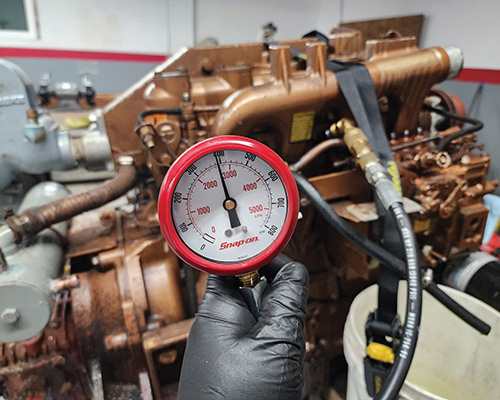
COMPRESSION
A diesel engine requires compression to run, a fact most boaters probably know in principle. However, did you know it needs near perfect compression to start and run? Unlike its gasoline counterparts that can get away with fairly low compression, diesels are significantly feistier when it comes down to the actual compression that builds up before it decides to ignite.
Imagine throwing a match into a 55 gallon drum of gasoline. What about a 55 gallon drum of diesel? The drum of gasoline will probably blow you off the face of the planet; while the diesel most likely will extinguish the match. Diesel needs good compression in order to ignite the atomized diesel. Compression is what will build up the heat required to reach the ignition point of diesel, so if compression is low, the diesel will never ignite. While harder to diagnose, it’s also less likely you’ll ever have to deal with poor compression as your cause of engine stoppage underway—more likely it will be the cause of your engine not starting.
WHAT ELSE CAN KILL MY ENGINE?
Now that you have an idea of what it takes to keep a diesel running, it’s important to understand there can be other factors that can lead to a dead diesel. Things like water intrusion, clogged exhaust elbows, electrical issues (on newer engines), and a host of other problems can surface, but most of these can be found, fixed, and prevented during your regular maintenance. And of course, there’s also the common engine failure activated by excess heat, which is less about overall engine function than the cooling system; but your engine may stop until you can resolve the cooling issue.
Working your way through the basics first will almost always work, and any good mechanic will always start with the basics first too. From my experience working on an ambulance, I learned how systems of the human body work together. I see many parallels with learning the basics of your engine systems and learning how they work together—as you build that knowledge, you’ll suddenly be able to think your way through the problem versus throwing parts at it and praying it goes away. This is all impossible if you and your boat are in an unsafe location, so make sure “your scene is safe” first.
If you can’t find the solution, knowing when to reach out for help is also a critical step. Many good mechanics will do this as well (we aren’t all-knowing) and a lot of us have colleagues in the industry who may have dealt with the same problem who can help us troubleshoot the issue at hand.
Having your trusty iron genoa die while underway is something none of us want to experience, but your diligence to understand your vessel’s systems and to develop a plan will give you confidence when stuff hits the fan.
Meredith Anderson is the owner of Madame Diesel, LLC, where she operates a mobile mechanic service and teaches hands-on marine diesel classes to groups and in private classes aboard clients’ own vessels.

